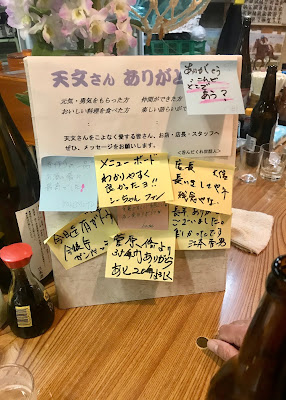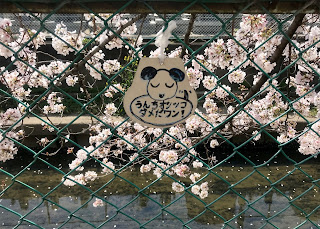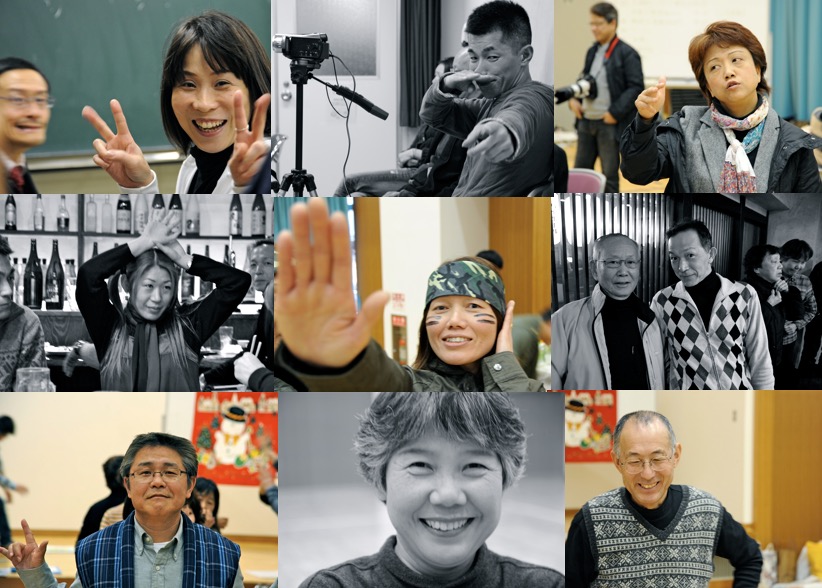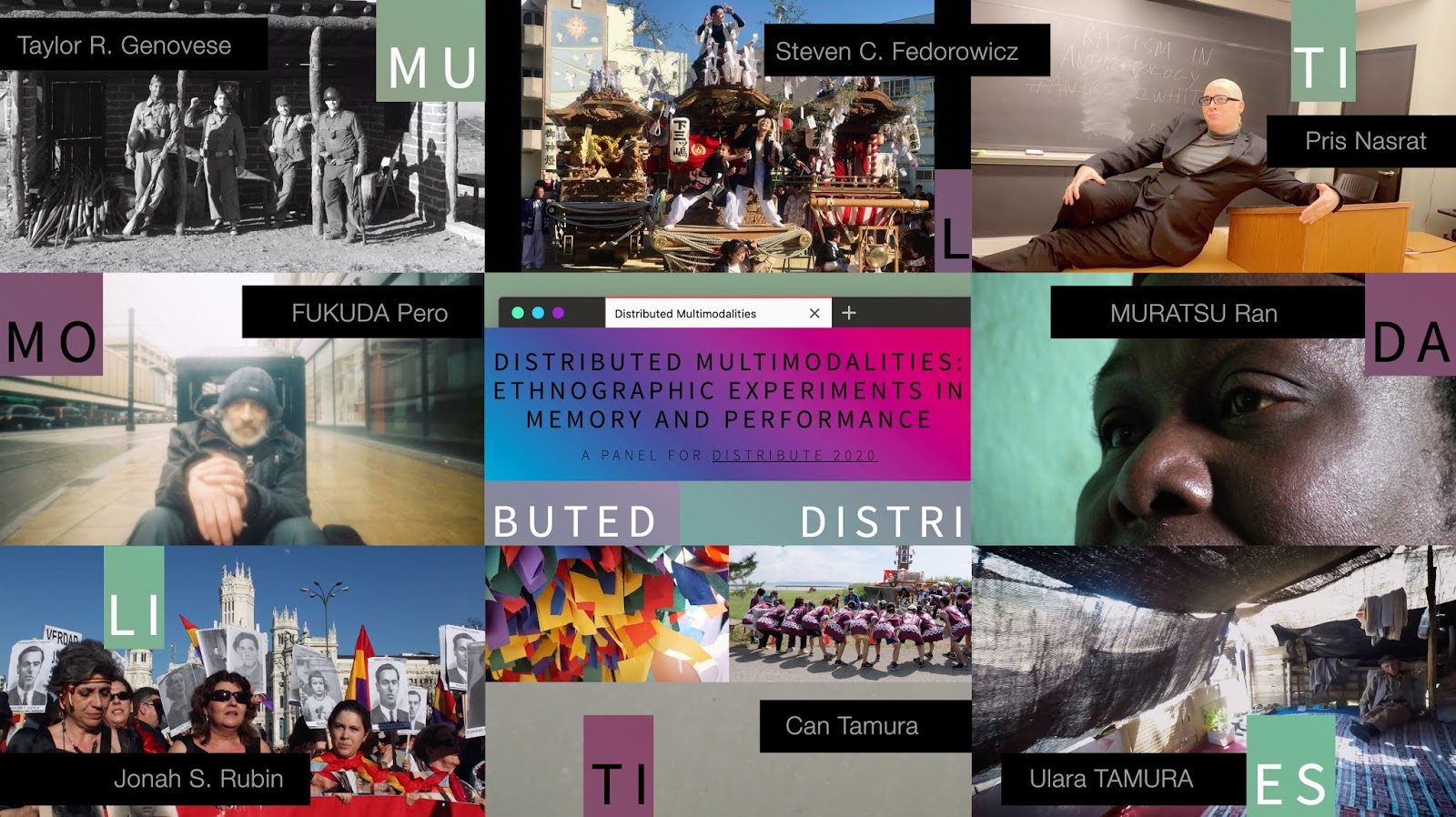Thursday, April 30, 2020
Wednesday, April 29, 2020
「Tenbun Closing」- Leading to a Week of Intensive Photography and Salvage Ethnography pt.4 - What's in my bag?
Compare with:
What’s in your fieldwork bag? https://savageminds.org/2007/08/13/whats-in-your-fieldwork-bag/
What's in Your Bag? https://anthrosource.onlinelibrary.wiley.com/doi/10.1111/AN.600
What's in Your Bag, Anthropologists? https://anthrosource.onlinelibrary.wiley.com/doi/abs/10.1111/AN.929
What’s in Your Bag? 2019 Edition https://www.anthropology-news.org/index.php/2019/07/23/whats-in-your-bag-2019-edition/
Tuesday, April 28, 2020
Monday, April 20, 2020
Sunday, April 19, 2020
Saturday, April 18, 2020
Sad News for VAOJ and Many Others: Tenbun Closing - Leading to a Week of Intensive Photography and Salvage Ethnography
The tachinomiya Tenbun has closed. Tenbun has been an important research subject and site for me for the last several years. And my personal history with the shop goes back over 22 years. I can't thank Tencho, shop employees and regular customers enough for their service, friendship and teaching me so much about Japanese culture.
For more background:
Photo Exhibition and Visual Ethnography - "Tachinomiya: There Are Two Sides to Every Noren"
"Tachinomiya" Photo Exhibition and Visual Ethnography: The First Week
"Tachinomiya" - A Successful and Memorable Photo Exhibition/Event/Research Method
AJJ Presentation - Tachinomiya: Photo Exhibition as Research Method
「Tachinomiya: Photo Exhibition as Post-Fieldwork Encounter」- Society for East Asian Anthropology Regional Conference 2019 in Tokyo
For now, here are a few shots from the last few days as I continue to deal with my shock and sorrow. More to come in the near future.
"Tencho I."
Notification of closing (rough translation from the Japanese):
Thank you for visiting us regularly. We feel sorry to announce this but we are closing the shop on March 28th, 2020. For 40 years we have really appreciated your support. We hope you understand it was a really difficult decision for us. Until then, our shop will be open as usual. It will be a short time until then but we hope you can visit us.
"Tencho II."
Messages of thanks and gratitude from customers.
One of the first shots I took a couple of years ago for the photo exhibition. It seems appropriate here...
Thursday, April 16, 2020
"DISTRIBUTED MULTIMODALITIES: ETHNOGRAPHIC EXPERIMENTS IN MEMORY AND PERFORMANCE A PANEL FOR DISTRIBUTE 2020"
This is our panel for the DISTRIBUTE 2020. Check back later for specifics about the VAOJ contribution...
Organizers
Taylor R. Genovese (Arizona State University)
Can Tamura (Filmmaker)
Panel Abstract
This panel explores historical, social, and cultural memory as distributed phenomena in the context of performance. We envision performance taking several ethnographic modes (with the caveat that these modes are not an exhaustive list): the practice of ethnography as being inherently dramaturgical and performative (Denzin 2003); the ways in which our research participants may perform in the presence of a researcher; the embodied, performative use of multimodal tools, such as the taking of photos, the recording of video, and the sharing of digital media; performance as a way of disseminating ethnographic data, whether that be through photographs, films, dance, theatre, music, soundscapes, etc.; and performance as a theoretical stance—a hacking of the Aristotelian notion of “phronesis,” an applied, active wisdom that is set apart from analytical knowledge (episteme) and technical knowledge (techne) by taking seriously the social and the political (Flyvbjerg 2001). This panel hopes to raise important questions such as: what kind of shifts in positionality may take place when one takes seriously the distribution of one’s ethnographic and personal performative practices, whatever they may be? How does performance become a means of distributing collective forms of memory? In what ways can multimodality be deployed within the discussion of performance, memory, and distribution?
Additionally, this panel is interested in how one’s ancillary performative practices (i.e. hobbies or external artistic endeavors) can generate new openings within one’s ethnographic research. We are attentive to the ways in which performance can break down contrived divisions between “serious scholarship” and creative pursuits; for example, if a phronetic approach to ethnography is deployed, how might it disrupt the established positivist, Western conception of what scholarship, learning, knowledge, dissemination, etc. can and should be (Genovese 2019)? In what ways might ethnographic phronesis (re)distribute research opportunities and their dissemination in a more egalitarian and decolonial fashion?
With this in mind, this panel hopes to produce an experimental audiovisual presentation in which each presenter’s research is not individually presented, but instead is woven among and between the other presentations—illuminating and generating previously unseen elements. This sensory approach—highlighting primarily the visual and the sonic—will evoke a contextual collaboration through juxtaposition and superimposition (for an example: see Tamura's film Je Suis Snowed In). The entire presentation will be descriptively hard captioned—as well as include audio descriptors— in order to make it as accessible as possible.
Panelists & Presentations
Neighborhood Autumn Festival in Japan: A Multimodal Visual Ethnography and Performance Steven C. Fedorowicz (Kansai Gaidai University)
Sitting Gazing Gazed FUKUDA Pero (Ritsumeikan University)
"You're breaking my immersion!" Dispatches from a simulated war zone Taylor R. Genovese (Arizona State University)
Multimodal Spirits MURATSU Ran (Kyoto University)
Dragthropology: Queer and trans theoretical transformations through enraged comedy Pris Nasrat (Independent Scholar)
Beyond an Informational Approach to Memory Politics: Re-membering Personhood at Spanish Mass Grave Exhumations Jonah S. Rubin (Knox College)
Kiriko Matsuri of Noto, Japan: The Outsider's Body as a Resource for Maintaining Local Rituals Can Tamura (Filmmaker)
From Backwardness to Pride: Yörük Cultural Revitalization through Performances in the Largest Nomadic Festival in Turkey Ulara TAMURA (Kanazawa University)
More information: https://distributedmultimodalities.carrd.co/
DISTRIBUTE 2020 Website: https://distribute.utoronto.ca/
Posted
6:03 PM
Labels:
announcement,
film,
multimodality,
performance,
virtual conference,
visual anthropology
0
comments


Monday, April 13, 2020
DISTRIBUTE 2020 - A Biennial Conference of the SCA and SVA - May 7-8-9
Welcome to Distribute 2020, a virtual/in-person conference.
The unequal distribution of power and wealth is growing by the day, fascism and racism are on the rise across the world, and entire ecosystems are dying. But, even as threats to life as we know it multiply, revolutionary new forms of redistributive politics are emerging.
We join this rising tide of voices to ask not only how anthropology might respond to these crises but also how to imagine another anthropology into existence. Gather with us from wherever you are for an international experiment in carbon-conscious, radically distributed conferencing.
More information: https://distribute.utoronto.ca/
What happens when the Society for Cultural Anthropology and the Society for Visual Anthropology get together? Plenty!
A lot of interesting papers, presentations, panels and films. And it was planned to be virtual before virtual was safe and cool...
VAOJ will participate in a panel/film. Check back later for a detailed announcement...
Posted
3:54 PM
Labels:
announcement,
mulitimodality,
virtual conference,
visual anthropology
0
comments


Sunday, April 12, 2020
Thursday, April 9, 2020
Asian Studies Conference Japan 2020 in Tokyo Canceled - along with at least one great panel (hope we can do it in the near future...)
This is what we were going to do:
Disability and Accessibility in Japan
Accessibility is more than ensuring the “ability” of people with disabilities to access products, services, structures, and systems. Questioning access in Japan requires unpacking the meaning given to the spaces, networks, and systems by the people that create and utilize them. Accordingly, this panel shifts its focus to the actors involved in Japan’s accessibility: experts, students, educators, and advocates.
The panel begins by analyzing the collaborative mechanisms of accessibility before introducing ethnographies of deaf and hard-of-hearing people to explore positionality in information accessibility. In the first paper, Mark Bookman uses the 1964 and 2020 Paralympic Games in Tokyo as case studies to illustrate how compliance, coordination, and competition between experts in various fields can make the difference between erecting and dismantling barriers for persons with disabilities. Next, Jennifer M. McGuire sheds light on deaf and hard-of-hearing university students’ emic understandings and usage of reasonable accommodations. McGuire shows how concerns about disability disclosure can pose distinct barriers to information access. Junko Teruyama presents an auto-ethnographic analysis of a non-signer in a team-ethnography of signing deaf and hard-of-hearing schoolteachers. Teruyama illuminates issues of language and information accessibility as well as cultural literacy, which reflect the lived experiences of schoolteachers in a hearing environment. Finally, Steven Fedorowicz’s ethnography of local grassroot deaf groups working to improve sign language interpretation, dissemination of basic and emergency information and understanding of diversity and intersections in representations of deaf identities illustrates how networking, lecture/workshops and media productions are used to advance cultural and personal accessibility.
Posted
5:16 AM
Labels:
accessibility,
announcement,
barrier-free,
conference,
deaf,
disability
0
comments


Wednesday, April 8, 2020
With a “state of emergency declaration” (緊急実態宣言) in effect for many parts of the country, including Osaka Prefecture" I'm staying home looking out the window watching the last of the cherry blossoms...
Posted
5:11 PM
Labels:
cherry blossoms 2020,
photo essay,
photography,
sakura,
state of emergency declaration,
桜,
緊急実態宣言
0
comments


Tuesday, April 7, 2020
New Publication: "Deaf Bodies: Toward a Holistic Ethnography of Deaf People in Japan"
Fedorowicz, S.C., “Deaf Bodies: Toward a Holistic Ethnography of Deaf People in Japan.” Journal of Inquiry and Research, Volume 111. Kansai Gaidai University, (2020): 269-286.
Abstract: This essay is an ethnographic exploration of deaf people in Japan, applying a holistic approach to the body. Deafness is considered as a condition that affects human behavior in terms of adaptation and coping rather than as simply a limiting deficiency/impairment. The bodily interactions of deaf people in their daily lives will be presented as the framework for this paper though Mark Johnson’s philosophy of embodied meaning (2007). The general situation of deaf people in Japan, including academic models, social welfare policies and Deaf/deaf politics, will be organized and presented through the use of Mikhail Bakhtin’s architectonics (1990). The language use of Japanese deaf people, especially their preferred language of Japanese Sign Language (JSL), will be contextualized through the use of Armstrong, Stokoe and Wilcox’s gestural approach to communication (1995). This research is a culmination of extensive long-term participant-observation, language study and data gathering through questionnaires, interviews and photography. How do deaf people in Japan deal with limits – or challenges – of communication with hearing people and among themselves? The paper concludes that for deaf people, the body is a media they use to create text and discourse through the performance of sign language, ultimately displaying a perceived notion of Deaf identity.
Key words: Deaf-deaf, Japanese Sign Language, Signed Japanese, holistic, ethnography
For more information: https://kansaigaidai.repo.nii.ac.jp/?action=pages_view_main&active_action=repository_view_main_item_detail&item_id=7946&item_no=1&page_id=15&block_id=22
Or download it for free as a pdf: https://kansaigaidai.repo.nii.ac.jp/?action=repository_uri&item_id=7946&file_id=19&file_no=1
Posted
7:11 PM
Labels:
Deaf-deaf,
ethnography,
holistic,
Japanese Sign Language,
Signed Japanese
0
comments


Monday, April 6, 2020
"Piko Taro redesigns signature song as hand washing melody"
NOTE: "Video unavailable (because fascist capitalists blocked it...) This video contains content from [company name deleted], who has blocked it from display on this website or application."
Direct link: https://www.youtube.com/watch?time_continue=4&v=WKfolJv6Kx8&feature=emb_logo
To go along with the recent VAOJ "How to wash your hands in 5 different countries..." post. Update Japan...
Text from Japan Today, 4/6/2020.
Japanese social media celebrity Pikotaro has returned as a leading twitter trend in Japan with a coronavirus hand washing song that repurposes his signature "Pen-Pineapple-Apple-Pen" (PPAP) to Pray-for-People-and-Peace.
He sings: "I have a hand, I have a soap. Uh! Wash! Wash! Wash! Wash...." The video was among the top five in a Twitter trend ranking in Japan on Monday.
Pikotaro, whose real name is Kazuhito Kosaka, wore the same gold animal print outfit he wore in PPAP video that went viral in 2016.
His hand washing video, shorter than the 2016 two minute hit that the Guinness World Record listed as the shortest song to make it into the Billboard Hot 100 chart, had also been viewed a quarter of a million times on YouTube since it was uploaded on Saturday.
Source: https://japantoday.com/category/entertainment/japanese-celebrity-redesigns-signature-song-as-hand-washing-melody
Link to PIKOTARO - PPAP (Pen Pineapple Apple Pen) (Long Version) [Official Video]: https://www.youtube.com/watch?v=Ct6BUPvE2sM
Link to 【OFFICIAL】I LIKE OJ/PIKOTARO(ピコ太郎): https://www.youtube.com/watch?v=MCIfjcc8J2M&list=PLCZ4uHjOFH0cG4tT-8bsVa5hVa-xkLlqn
Sunday, April 5, 2020
Subscribe to:
Posts (Atom)





























































